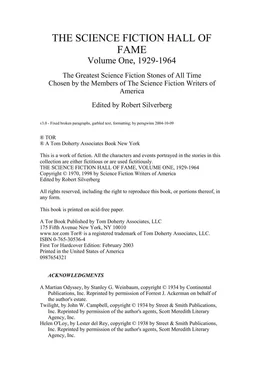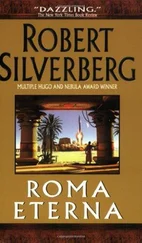I don't know how long that city had been deserted. Some of the men from the other cities said it was a hundred and fifty thousand years. Some went as high as three hundred thousand years. Three hundred thousand years since human foot had been in that city. The taxi machine was in perfect condition, functioned at once. It was clean, and the city was clean and orderly. I saw a restaurant and I was hungry. Hungrier still for humans to speak to. There were none, of course, but I didn't know.
The restaurant had the food displayed directly, and I made a choice. The food was three hundred thousand years old, I suppose. I didn't know, and the machines that served it to me didn't care, for they made things synthetically, you see, and perfectly.
When the builders made those cities, they forgot one thing. They didn't realize that things shouldn't go on forever.
It took me six months to make my apparatus. And near the end I was ready to go; and, from seeing those machines go blindly, perfectly, on in orbits of their duties with the tireless, ceaseless perfection their designers had incorporated in them, long after those designers and their sons, and their sons' sons had no use for them—
When Earth is cold, and the Sun has died out, those machines will go on. When Earth begins to crack and break, those perfect, ceaseless machines will try to repair her—
I left the restaurant and cruised about the city in the taxi. The machine had a little, electric-power motor, I believe, but it gained its power from the great central power radiator. I knew before long that I was far in the future. The city was divided into two sections, a section of many strata where machines functioned smoothly, save for a deep humming beat that echoed through the whole city like a vast unending song of power. The entire metal framework of the place echoed with it, transmitted it, hummed with it. But it was soft and restful, a reassuring beat.
There must have been thirty levels above ground, and twenty more below, a solid block of metal walls and metal floors and metal and glass and force machines. The only light was the blue-green glow of the mercury vapor arcs. The light of mercury vapor is rich in high-energy- quanta, which stimulate the alkali metal atoms to photo-electric activity. Or perhaps that is beyond the science of your day? I have forgotten.
But they had used that light because many of their worker machines needed sight.
The machines were marvelous. For five hours I wandered through the vast power plant on the very lowest level, watching them, and because there was motion, and that pseudo-mechanical life, I felt less alone.
The generators I saw were a development of the release I had discovered —when?
The release of the energy of matter, I mean, and I knew when I saw that for what countless ages they could continue.
The entire lower block of the city was given over to the machines. Thousands. But most of them seemed idle, or, at most, running under light load. I recognized a telephone apparatus, and not a single signal came through. There was no life in the city. Yet when I pressed a little stud beside the screen on one side of the room, the machine began working instantly. It was ready. Only no one needed it any more. The men knew how to die, and be dead, but the machines didn't.
Finally I went up to the top of the city, the upper level. It was a paradise.
There were shrubs and trees and parks, glowing in the soft light that they had learned to make in the very air. They had learned it five million years or more before.
Two million years ago they forgot. But the machines didn't, and they were still making it. It hung in the air, soft, silvery light, slightly rosy, and the gardens were shadowy with it. There were no machines here now, but I knew that in daylight they must come out and work on these gardens, keeping them a paradise for masters who had died, and stopped moving, as they could not.
In the desert outside the city it had been cool, and very dry. Here the air was soft, warm and sweet with the scent of blooms that men had spent several hundreds of thousands of years perfecting.
Then somewhere music began. It began in the air, and spread softly through it.
The Moon was just setting now, and as it set, the rosy-silver glow waned and the music grew stronger.
It came from everywhere and from nowhere. It was within me. I do not know how they did it. And I do not know how such music could be written.
Savages make music too simple to be beautiful, but it is stirring.
Semisavages write music beautifully simple, and simply beautiful. Your Negro music was your best. They knew music when they heard it and sang it as they felt it.
Semicivilized peoples write great music. They are proud of their music, and make sure it is known for great music. They make it so great it is top-heavy.
I had always thought our music good. But that which came through the air was the song of triumph, sung by a mature race, the race of man in its full triumph! It was man singing his triumph in majestic sound that swept me up; it showed me what lay before me; it carried me on.
And it died in the air as I looked at the deserted city. The machines should have forgotten that song. Their masters had, long before.
I came to what must have been one of their homes; it was a dimly- seen doorway in the dusky light, but as I stepped up to it, the lights which had not functioned in three hundred thousand years illuminated it for me with a green-white glow, like a firefly, and I stepped into the room beyond. Instantly something happened to the air in the doorway behind me; it was as opaque as milk. The room in which I stood was a room of metal and stone. The stone was some jet-black substance with the finish of velvet, and the metals were silver and gold. There was a rug on the floor, a rug of just such material as I am wearing now, but thicker and softer. There were divans about the room, low and covered with these soft metallic materials. They were black and gold and silver, too.
I had never seen anything like that. I never shall again, I suppose, and my language and yours were not made to describe it.
The builders of that city had right and reason to sing that song of sweeping triumph, triumph that swept them over the nine planets and the fifteen habitable moons.
But they weren't there any more, and I wanted to leave. I thought of a plan and went to a subtelephone office to examine a map I had seen. The old World looked much the same. Seven or even seventy million years don't mean much to old Mother Earth. She may even succeed in wearing down those marvellous machine cities. She can wait a hundred million or a thousand million years before she is beaten.
I tried calling different city centers shown on the map. I had quickly learned the system when I examined the central apparatus.
I tried once—twice—thrice—a round dozen times. Yawk City, Lunon City, Paree, Shkago, Singpor, others. I was beginning to feel that there were no more men on all earth. And I felt crushed, as at each city the machines replied and did my bidding. The machines were there in each of those far vaster cities, for I was in the Neva City of their time. A small city. Yawk City was more than eight hundred kilometers in diameter.
In each city I had tried several numbers. Then I tried San Frisco. There was some one there, and a voice answered and the picture of a human appeared on the little glowing screen. I could see him start and stare in surprise at me. Then he started speaking to me. I couldn't understand, of course. I can understand your speech, and you mine, because your speech of this day is largely recorded on records of various types and has influenced our pronunciation.
Some things are changed; names of cities, particularly, because names of cities are apt to be polysyllabic, and used a great deal. People tend to elide them, shorten them.
Читать дальше












